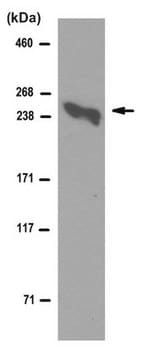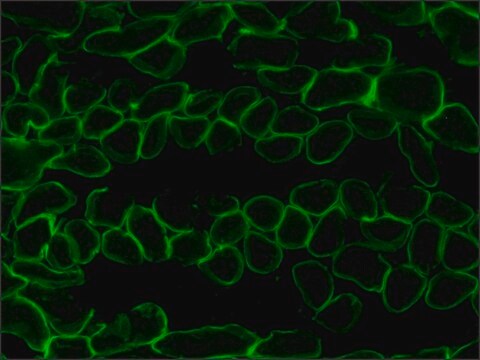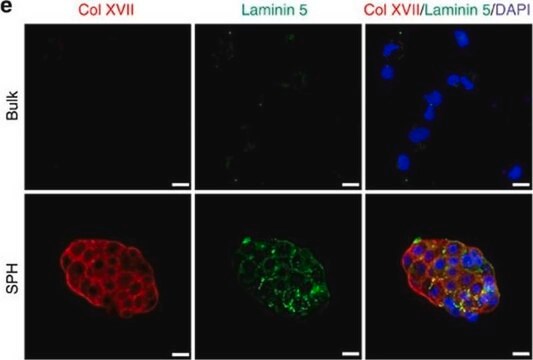MAB1924
Anti-Laminin α5 Antibody, clone 4C7
ascites fluid, clone 4C7, Chemicon®
Synonym(s):
Anti-AA408760, Anti-AA408762, Anti-AI853660, Anti-laminin-511, Anti-mKIAA0533
About This Item
Recommended Products
biological source
mouse
Quality Level
antibody form
ascites fluid
antibody product type
primary antibodies
clone
4C7, monoclonal
species reactivity
human
manufacturer/tradename
Chemicon®
technique(s)
ELISA: suitable
immunohistochemistry: suitable
immunoprecipitation (IP): suitable
isotype
IgG2a
NCBI accession no.
UniProt accession no.
shipped in
dry ice
target post-translational modification
unmodified
Gene Information
human ... LAMA2(3908)
Specificity
Application
Immunofluorescence - tissue staining pattern is most consistent with that observed for laminin alpha5 in the mouse(Miner et al., 1997)
Affinity chromatography
Immunoprecipitation
Does not work for Western blotting
Optimal working dilutions must be determined by end user.
Physical form
Analysis Note
Developing striated muscle tissue
Other Notes
Legal Information
Not finding the right product?
Try our Product Selector Tool.
Storage Class Code
10 - Combustible liquids
WGK
WGK 1
Flash Point(F)
Not applicable
Flash Point(C)
Not applicable
Certificates of Analysis (COA)
Search for Certificates of Analysis (COA) by entering the products Lot/Batch Number. Lot and Batch Numbers can be found on a product’s label following the words ‘Lot’ or ‘Batch’.
Already Own This Product?
Find documentation for the products that you have recently purchased in the Document Library.
Our team of scientists has experience in all areas of research including Life Science, Material Science, Chemical Synthesis, Chromatography, Analytical and many others.
Contact Technical Service








